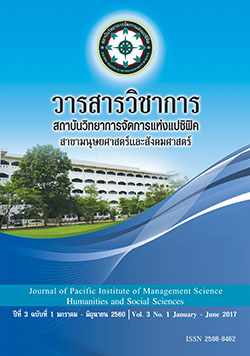Local Administrative Organization Administrators’ Knowledge of Good Governance Principles of Muang District Phayao Province
Keywords:
administration, good governance, local governmentAbstract
This study was aimed at investigating the knowledge of good governance principles of Local Administrative Organization Administrators in Muang District, Phayao Province. Questionnaire was employed to collect the data from 114 participants in the area of Muang District, Phayao Province. The data was analyzed using frequency, percentage, mean, and standard deviation. The findings revealed that the local administrative organization administrators held knowledge regarding good governance principles, in the overall, at high level. The principle holding the highest mean score was participation. The subsequent principles were morality, responsibility, rules of law, and effectiveness. The principle gaining the lowest mean score was transparency. Suggestions regarding the knowlege of good governance principles for the local administrative organization were proposed. With regard to rules of law principle, there should be an encouragement for the staff to receive practical training about law, desciplines, and regulations that can faclitate the performance and optimize the quality service to the people by adhering the focus to public interests. Concerning morality principle, the staff should be stimulated about awarness in their jobs with an emphais on moralities and etiquttes in order that the staff can perform their tasks based on the moral principles. Regarding responsibility principle, the staff should be supported to perform their tasks adhered to the law and related regulations with an emphais on the public interests, meeting the needs of the public, and alleviating the public’s sufferings. For effectiveness principle, budget spending and utilizing of the public resources by the local administrative organization must adhere to cost-effective protocol that also meet the needs of the public with an emphasis on participation by the public. Utilizing of budget and public resources must aim at achieving maximized benefits of the taxpayers by implementing modern tools and technology for public convenience. According to participation principle, the staff should be allowed to participate in manipulate the administrative direction of the local administrative organization by taking the public’s problems and needs to formulate the administration plan. The participation should also cover public hearing from both the staff and the people as means to improve the administration for sustainable achievement. About transparency principle, the administrators should allow public assembly to participate in monitoring and evaluating the administration. The admintration performance results reports should be publicly announced and the budget spending must be publicly reported and in details. Good governance principles are developed with an aim to promote equality for every walk of life in the society to attain better quality of life. The successful implementation of the principles depend on the cooperation among public and private sectors by means of decentralization with an emphasis on promoting transparency. Importantly, good governance means participation of the people in an equality manner with answers and clarified statements.
References
กฤษณ์ สัมพันธ์เมนะสตู และคณะ. องค์กรปกครองส่วนท้องถิ่นกับการบริหารจัดการตามหลักธรรมาภิบาล. กรุงเทพมหานคร : สถาบันพระปกเกล้า, 2546
กิติมา ปรีดีดิลก. ทฤษฎีบริหารองค์การ. กรุงเทพมหานคร : ธนะการพิมพ์ ,2529.
เกษียร เตชะพีระ. ธรรมรัฐ-ธรรมและพีเพิล. กรุงเทพมหานคร : ธนะการพิมพ์ , 2541.
ฉันทนาบรรพศิริโชติ. การพัฒนาและความขัดแย้ง : ทางเลือกบนเส้นทางประชาธิปไตย. กรุงเทพมหานคร : สำนักพิมพ์ มูลนิธิเด็ก, 2543.
ชัยอันนต์ สมุทวาณิช. ประชารัฐกับการเปลี่ยนแปลง. กรุงเทพมหานคร : สถาบันนโยบายศึกษา, 2542.
บุษบง ชัยเจริญวัฒนะ และ บุญมี ลี้. รายงานการวิจัยเรื่องตัวชี้วัดธรรมาภิบาล. กรุงเทพมหานคร : สถาบันพระปกเกล้า, 2544.
ประเวศ วะสี. ทฤษฎีพระมหาชนก : ทิศทางแห่งการพัฒนา. สถาบันราชภัฎสุราษฎร์ธานี.กรุงเทพมหานคร : อมรินทร์ พริ้นติ้งแอนด์พลับบลิชซิ่ง, 2542.
พิทยา สุนทรวิภาค. ธรรมาภิบาลกับองค์การบริหารส่วนตำบล. มติชน. 3 มิถุนายน 2545.
วสันต์สุวรรณ. การมีส่วนร่วมทางการเมืองของประชาชนในองค์การบริหารส่วนตำบล :ศึกษาเฉพาะกรณีตำบลหนองจ๊อม อำเภอสันทราย จังหวัดเชียงใหม่. วิทยานิพนธุรป.ม. (รัฐศาสตร์๎Iเชียงใหม่ : มหาวิทยาลัยเชียงใหม่, 2547.
สุดเขตต์ เข็มไท. อำนาจหน้าที่ี่ขององค์การบริหารส่วนตำบลในการดำเนินงานภายใต้กฎหมายที่เกี่ยวข้องกับสาธุารณสุข. กรุงเทพมหานคร : โรงพิมพ์องค์การสงเคราะห์ทหารผ่านศึก, 2540.
สุภัทรมาศ จริยเวชช์วัฒนา. การบริหารจัดการเทศบาลตามหลักธรรมาภิบาล : กรณีศึกษาเทศบาลตำบลบ้านฉาง. วิทยานิพนธ์ รป.ม. (นโยบายสาธารณะ) กรุงเทพมหานคร : มหาวิทยาลัยบูรพา, 2547.
อำเภอเมืองพะเยา. ประวัติอำเภอเมืองพะเยา. (ออนไลน์): แหล่งที่มา. http://www.wikipedia.org. 2556.
Downloads
Published
Issue
Section
License
บทความที่ได้รับการตีพิมพ์เป็นลิขสิทธิ์ของ สถาบันวิทยาการจัดการแห่งแปซิฟิค
ข้อความที่ปรากฏในบทความแต่ละเรื่องในวารสารวิชาการเล่มนี้เป็นความคิดเห็นส่วนตัวของผู้เขียนแต่ละท่านไม่เกี่ยวข้องกับสถาบันวิทยาการจัดการแห่งแปซิฟิค และคณาจารย์ท่านอื่นๆในสถาบันฯ แต่อย่างใด ความรับผิดชอบองค์ประกอบทั้งหมดของบทความแต่ละเรื่องเป็นของผู้เขียนแต่ละท่าน หากมีความผิดพลาดใดๆ ผู้เขียนแต่ละท่านจะรับผิดชอบบทความของตนเองแต่ผู้เดียว







